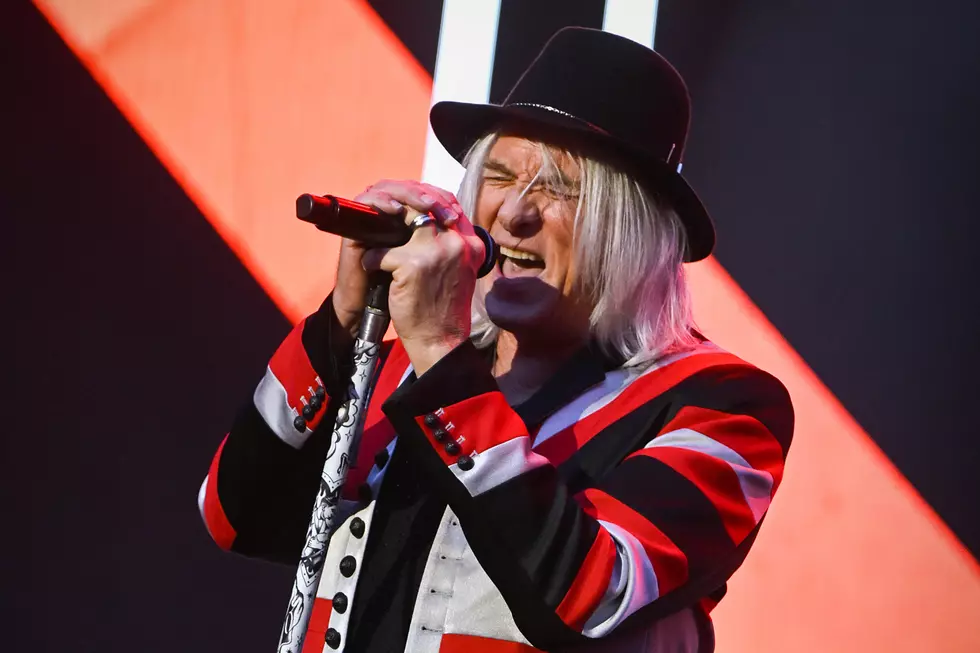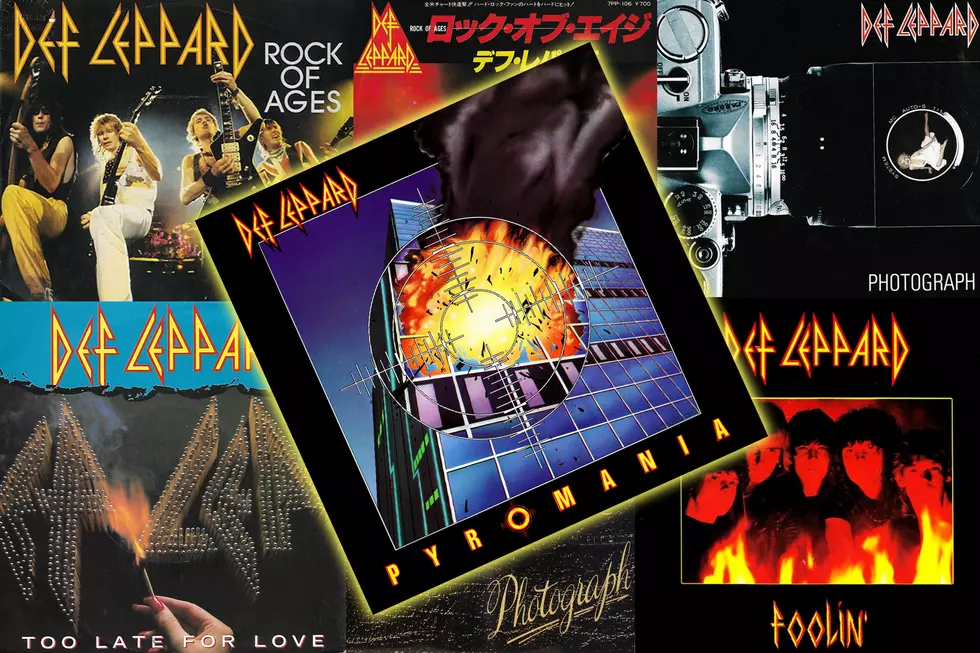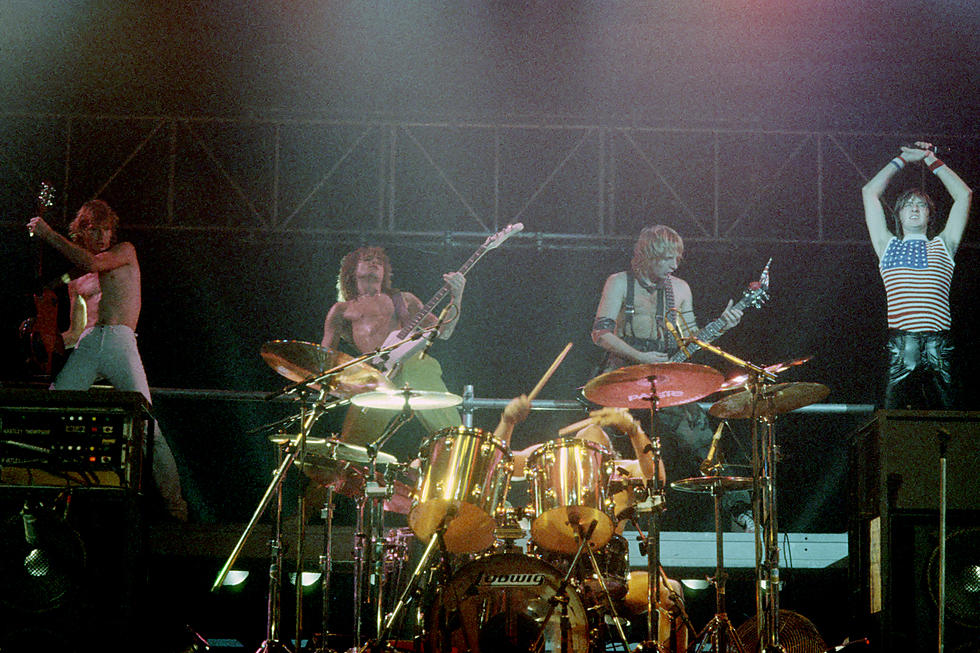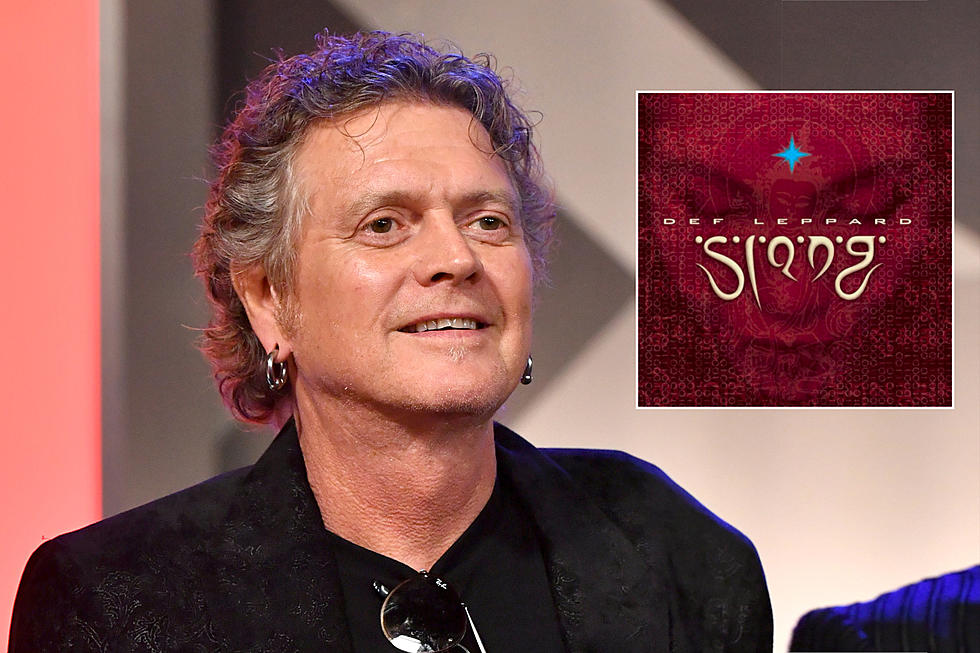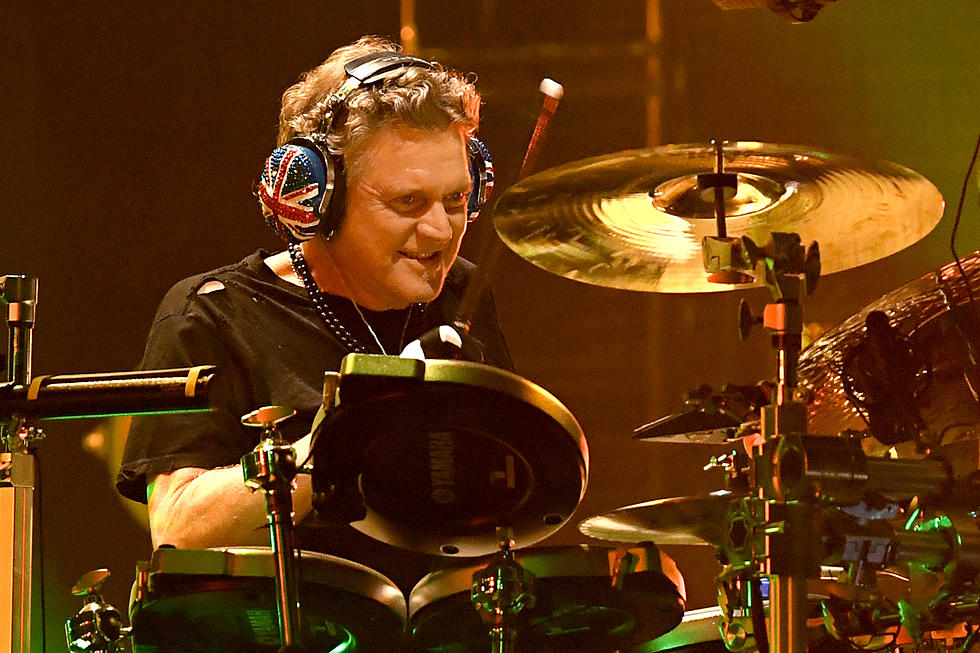
Def Leppard’s Rick Allen Reveals New ‘Electric Hand’ Art Collection And the Band’s Plans For New Music
A lot has happened with Def Leppard drummer Rick Allen since we spoke last year prior to Def Leppard’s highly successful tour with Heart. He’ll of course be back on the road this summer with the band, touring with Poison and Lita Ford, but he’s also debuting his first collection of musically inspired fine art. The collection, titled ‘Electric Hand: Rhythm & Change’ finds the veteran hard rock drummer exploring music from entirely new angles, with a series of pieces that were captured in collaboration with a Los Angeles-based company called SceneFour.
Working with SceneFour, Allen used special drum sticks to capture the rhythmic aspects of his drumming, creating unique one of a kind abstract art with his playing. Allen’s lifetime of experience behind the kit ultimately opened the door to this new experience which has shown him a new side of who he is as an artist and where he’s going from here.
We spoke with Allen at length to get inside the concepts that spawned the ‘Electric Hand’ collection and the connections that are attached to his rich career and legacy performing with Def Leppard.
Let’s talk about your new fine art collection, ‘Electric Hand: Rhythm & Change.’ The imagery on this stuff really is incredible. How long have you been working on it?
We actually put a lot of the pieces together the day I was leaving for the last tour. I’ve been working with SceneFour for quite a while now and when they explained the process to me, it was difficult to really grasp. But then once I got going, it was really just a process of using light sticks as opposed to paint brushes, capturing entire performances on a single frame.
What that did for me is it revealed these hidden worlds and it was really interesting to see them. Because when it came to naming the pieces, it was very easy for me because they were all aspects of things I was passionate about. It’s been a beautiful abstract journey, I’ve really enjoyed it.
The actual performances, were you playing on stage with Def Leppard? Where were these performances captured to create the art?
We actually needed a dark studio, so I invited them up to my studio where I’ve done a lot of work with Def Leppard and I had my stage kit set up there at the studio. It worked out really well, just having a really dark room, a very intimate enclosed space. It made for a great way to capture the ultimate performance.
The initial art takes shape around your playing. Once that is in place, how much manipulation is there to create the final pieces. Is there any additional work after the fact or is it all created in the moment when it is captured?
That’s a good question. Because some of the pieces were captured pretty much in the moment and there wasn’t too much in the way of manipulation. [But] there’s one of the pieces for instance in the collection called ‘Shape Shifter.’
One of the reasons that the name came about was because it started out with a lot of really deep reds and I started messing with it here at home and Ravi [SceneFour founder Ravi Dosaj], the art director, started messing with it at SceneFour and we started coming up with all of these different versions of it, just by changing the color. I realized that it was kind of the epiphany of my life and a lot of people’s lives, whether they realize it or not. We’re different people today because of the experience that we had yesterday, if you know what I mean.
Absolutely.
So what wasn’t my favorite piece ended up actually becoming my favorite piece because of the fact that as we brought out different colors, it brought out different aspects of the piece and then I started to realize that it was just a reflection of my journey. My sort of life path and the fact that if you’re growing, you’re pushing out and you’re expressing different aspects of yourself.
As you said, we are changed and molded by our experiences, so what did this experience do for you? What sort of perspective did you walk away with?
It allowed me to realize in a more sure way that art is interchangeable. If you can paint or dance or play an instrument or anything really that is creative or expressive, I think as long as you stick around long enough, the muscle memory catches up to the vision. So if you can see or hear something in your head, than I truly believe that you can express yourself in many, many different ways and that’s the fantastic thing.
For me, the way that people are reacting to this, it’s showing me that they can connect to me in different ways and hopefully be inspired to experience different parts of themselves. The whole collection to me just conjures up the whole idea of hope and being able to uncover parts of yourself that you either a) forgot about or b) you are just re-remembering. Like aspects of when we were kids or "Oh man, I used to do that all of the time," or "I used to paint" and there was no thought behind it, it was just being in the zone where you’re in the moment. And that’s exactly what this allowed me to do.
Especially being able to paint in mid-air, it was very natural for me to go there. So I just really want people to be inspired to possibly do these kind of things for themselves and not get stuck in a rut.
There are 300 pieces available total in this collection, which is not a big number, considering your worldwide fanbase. Do you have other ideas percolating in your head based on this experience, for other types of art that you might want to do in the future?
Yeah, I think with any new project, there’s a little bit of fear, because I don’t want people to perceive this in the wrong way. It really does come from a very genuine place in terms of me being able to share parts of myself that I’ve never been able to share before. I think now that I’ve done this one [project], I’ve been taking photographs for many, many years.
My wife complains.....well, it’s not really a complaint, it’s more of an observation as it were, "When are you going to put some of this stuff up on the wall?" It just seems to get stuck on a hard drive and I feel like I hoard the things as opposed to allowing people to experience them and let them out. So yes, to cut a long story short!
You used the word “fear” and I read recently that you still get nervous before going onstage to play with Def Leppard. Where does that come from?
I think that’s where repetition can be perceived as the enemy. Because you always want to be as good tonight as you were yesterday. There’s always that little bit of ‘maybe I’m a little tired tonight,’ but normally you get up there on stage and as you count in the first bar of the song, that all dissolves. All that fear dissolves and all of the adrenaline that you experienced transforms, you transform that energy into a way to connect with the audience and ultimately get to where I call ‘the zone.’
The zone is a place without thought - you’re just playing! You know, when you put pen to paper, I’ve heard it said that it’s where the pen kind of leaves the page. It’s the same with playing. it’s just that constant search for the perfect zone. Occasionally throughout the show, I’ll go back into my head and I’ll start thinking and then I’m like "You’re going to screw up or make a mistake" and then as soon as you push it back down and you just start playing from your heart and you’re just playing, then everything is cool again.
I always enjoy hearing an artist say that they have those nerves still, because it proves they’re still committed to what they do. And whether its you or Eddie Van Halen or Neil Peart, you’re expected to be God every night, and I know that some nights, that just doesn’t happen entirely as planned.
Oh my God, I know. You know, it’s interesting, there’s those nights when you do make a mistake, but the way that you recover, it’s so amazing, because you’re just in the flow. And then you listen to it afterwards and you go "Man, I could make that mistake again.That was genius!" [Laughs] But unfortunately, our minds don’t always work that way.
The way you recover from something can sometimes lead you on to a completely new way of doing something [and] a completely new idea. So there’s always that X factor, whenever you play and it’s different every single night. There’s no such thing as a carbon copy as it were. It’s just different - you feel different, your body clock is different, the circumstances, the people that are there, the weather, you name it. It’s a blessing though, really, to be able to do this at this level this far into my career has just become a huge blessing.
Well and with this art project, it’s nice to have someone approach you at this stage of your career with interest and it’s cool that the collaboration came off so successfully. If you look back at Rick Allen circa ‘On Through The Night,’ I’m not sure that he would have had any idea that someday he’d be doing a project like this related to his playing.
You know what, you’re absolutely right and that’s the wonderful thing about SceneFour and this opportunity. It’s just another way to express myself and I’m very grateful for that opportunity.
I think that with all of the evolution you went through as a player on the first few albums, you might have been skeptical hearing about these “light sticks,” thinking that perhaps it was just something that Mutt Lange hadn’t told you about yet.
[Laughs] It was pretty strange at first, but then discovering that these hidden realms exist is life changing. It’s really fun to be able to do this.
One of these pieces ties in with the Raven Drum Foundation. Can you talk a little bit about the work you’re doing with them?
We started, myself and my wife, we started in about 2001. We used to work with all different paths of population and it was fantastic, using drumming as a way to connect with each other and help themselves during times of crisis. I visited Walter Reed Army Medical Center in D.C. and I saw so much suffering there, it was insane.
But at the same time, I saw tons and tons of potential and I realized at that moment that what was in front of us was a whole generation of men and women coming out of war zones that really needed the country’s help. We needed to somehow step up. I realized that what happened to me was horrible, I mean, I can’t even explain to you. But it’s become this blessing because of the fact that I can share my life experience with people and somehow inspire them to move forward and really stop comparing themselves to themselves or comparing themselves to others.
And that was a huge hurdle for me. Just celebrate the fact that "Wow, I am unique. I can do things that nobody else can do. Yes, I can’t do what I used to do, but I can do things that are really different [compared] to a two-armed player." What you do is once you embrace that, you end up making that something that nobody else can do [into] something unique to you. Once we get people onto that wavelength, the sky is the limit, they can do anything. The whole idea is that anybody can be a hero.
With ‘Hysteria’ reaching its 25th anniversary this year, when you look back at what was a very challenging period for you, what was that turning point when you knew that you could carry on and continue making music?
That’s a good question. I think it was one particular day when Phil [Collen] and Steve [Clark], I knew Phil and Steve were going to come visit me while I was in the hospital. I wasn’t really sure if they were going to make it because they were really nervous about coming. It was the first time they’d really seen me since the accident.
But a few days prior to them coming, I started thinking ‘Well, what are we going to talk about?’ Because I was kind of in a place where I didn’t really know whether I wanted to do this anymore. I asked my brother, I said ‘Can you grab me a boombox and bring some music in that I used to listen to?’ And I started tapping my feet down at the bottom of the bed on this piece of foam and I realized that I could play all of the basic rhythms that I’d always played, right from the beginning.
When Phil and Steve finally arrived a couple of days later, they saw what I was doing and I think at that point, I realized that I could actually go on and here we are. It’s been a heck of a journey, but we’re still here.
‘Photograph’ recently came in at number 55 on our list of the Top 100 Classic Rock Songs. That song came to life during the ‘High N’ Dry’ sessions initially. What finally brought it home when you were recording ‘Pyromania?’
Oh man, we went through so many different versions and so many different sections and I think that was one of the songs that really took just tons and tons of time. But I think really just getting the chorus right and to this day, it’s really challenging to do that one live. It’s really quite a struggle and you wouldn’t necessarily think so. It sounds simple, but that’s the thing, making things that are really tricky seem very easy to do. I think once we got the chorus right, that was it, the whole thing kind of fell into place.
What’s the challenging element of doing it live?
Well, for the guys, it’s like a couple of rubber bands wrapped around your nut sack really helps with the high notes. The range is just, in places, really, guys shouldn’t sing that high.
Was there a sense at the time that you were making those albums, ‘Pyromania’ and ‘Hysteria,’ that maybe you were pioneering recording techniques with what you were doing as a band in the studio?
I think I started to realize that more towards the end of ‘Pyromania’ and actually, starting on ‘High N’ Dry.’ ‘High N’ Dry’ was the first time we’d worked with Mutt and he always brought the element into the studio where he somehow got you to challenge yourself, which was really clever that he did that, as opposed to him cracking the whip. He somehow got you to come out with your best performances, whatever that looked like. I think to this day, I’m still learning things about ‘Hysteria’ and ‘Pyromania.’ As I listen to it more and more, I pick up things along the way.
As far as the new music that has been reportedly in the works for Def Leppard, what can you share on the subject?
We’re going to be taking the ‘Sparkle Lounge’ back out on the road with us, which is an ‘imaginary studio,’ or the studio that came out of our imagination. We set this thing up everyday, this drum kit, all of the instruments and microphones and it’s a great way to come up with new music while we’re in that mode of playing in front of live audiences, which is very inspiring as you can imagine.
I’ve heard a couple of things - Phil has sent me a few ideas and I’m working on some ideas to send back to him. You just reminded me that I need to get that to him today! I can tell you that they are some really exciting ideas, so I’m excited for a new record in the not too distant future.
More From Ultimate Classic Rock
